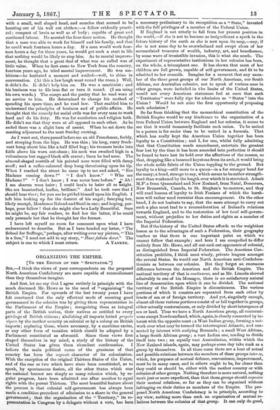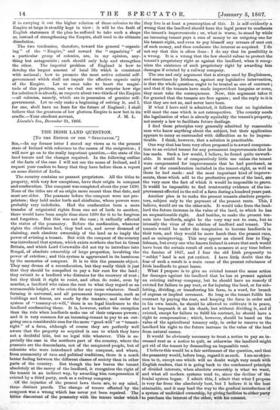ORGANIZING THE EMPIRE.
[To THE EDTTOR OF THE " SPECTATOR."' Sin,—I think the views of your correspondents on the proposed North American Confederacy are more capable of reconcilement than they themselves imagine.
And first, let me say that I agree entirely in principle with the much discussed Mr. Howe as to the need of " organizing " the British Empire. For upwards of the last twenty years I have felt convinced that the only effectual mode of ensuring good government to the colonies was by giving them representation in the Parliament of the Empire ; recognizing them as integral parts of the British nation, their natives as entitled to every privilege of British citizens ; abolishing all imports levied proprio vigore by the mother country on colonial or by a colony on British imports ; replacing these, where necessary, by a maritime excise, or any other form of taxation which should be adopted by a Parliament constituted as aforesaid. Since these views first shaped themselves in my mind, a study of the history of the United States has given them 'abundant confirmation. I believe the main political cause of the greatness of that country has been the organic character of its colonization. With the exception of the original Thirteen States of the Union, and of the one or two which have since been constituted, so to speak, by spontaneous fission, all the other States which star the national banner are simply so many colonies which, by re- gular progress, have been admitted one after another to equal rights with the parent Thirteen. The most beautiful feature about the process is that colonial self-government has always been made a condition precedent of admission to a share in the general government.; that the organization of the "Territory," its re- presentation in Congress by a delegate without a vote, has been
a necessary preliminary to its recognition as a "State," invested with the full privileges of a member of the Federal Union.
If England is not utterly to fall from her present position in the world,—if she is not to become as insignificant a speck in the future history of the earth as she is now upon its map,—nay, if she is not some day to be overwhelmed and swept clean of her accumulated treasures of wealth, industry, art, and beneficence, by some wave of irresistible invasion, this is what she needs. The experiment of representative institutions in her colonies has been, on the whole, a triumphant one. It has shown that most of her children are full grown, capable of self-government, and fit to be admitted to her councils. Imagine for a moment that any mem- ber of the three great groups of our North American, our South African, our Australian colonies, not to speak of various ones in other groups, were included in the limits of the United States, would not every American statesman feel at once that such "Territories" were fully ripe for admission as " States " into the Union? Would he not seize the first opportunity of proposing such admission ?
So far from thinking that the monarchical constitution of the British Empire would be any hindrance to the organization of a true Federal Union between England and her colonies, it seems to me that it would immensely facilitate such union. To be united in a person is far easier than to be united in a formula. That which has really kept the American Union together has been loyalty to a Constitution; and I, for one, whilst fully admitting that that Constitution needs amendment, entertain the greatest fear lest by the time it has been amended into perfection it should be found to have lost its hold over the affections of the masses, so that, dropping like a loosened keystone from its arch, it would bring the whole noble fabric of the Union toppling to the ground. But loyalty to a king—still more to a queen—is a far stronger bond for the many; a bond, strange to say, which seems to be rather strength- ened than weakened by the length over which it is stretched. Admit M.P'.8 from Queensland and New Zealand, from Natal, Demerara, New Brunswick, Canada, to St. Stephen's to-morrow, and they will read lessons of loyalty to Irish Fenians of which the harsh- ness will rather need restraint than encouragement. On the other hand, I do not hesitate to say, that the mere attempt to carry out such a plan must lead to a reconsideration of Ireland's relations towards England, and to the restoration of her local self-govern- ment, without prejudice to her duties and rights as a member of the Imperial Federation.
But if the history of the United States affords us the weightiest lesson as to the advantages of such a Federation, their geography teaches us that there is one important point on which we cannot follow that example ; and here I am compelled to differ entirely from Mr. Howe, and all out-and-out opponents of colonial, as distinguished from Imperial Federation. The American Con- stitution prohibits, I think most wisely, private leagues amongst the several States. So would our North American anti-Confedera- tionists as between our colonies. But they forget an enormous difference between the American and the British Empire. The national territory of that is continuous, and as Mr. Lincoln showed admirably in one of his Messages, there is no satisfactory natural line of demarcation upon which it can be divided. The national territory of the British Empire is discontinuous. The various portions of which it consists are separated from each other by tracts of sea or of foreign territory. And yet, singularly enough, almost all these various portions consist of or fall together in groups, either actually conterminous, or only divided by short interspa.ces of sea or land. Thus we have a North American group, all contermi- nous except Newfoundland, which, again, is closely connected by in- terest with the opposite coast ; a West Indian group, forming a net- work over what may be termed the intertropical Atlantic, and con- nected by interest with outlying Bermuda ; a small West African, a large South African group ; a vast Indian one, tending to divide itself into two ; an equally vast Australasian, within which the New Zealand islands, again, may perhaps some day take rank as a group by themselves. In all these cases there are a host of actual and possible relations between the members of these groups inter se, which, for purposes of mutual defence, convenience, improvement, must be in many cases, and in others ought to be, far closer than they could or should be, either with the mother country or with colonies of other groups. Nothing therefore is more natural, nothing moie just or more expedient, than that these groups should organize their mutual relations, so far as they can be organized without infringing on their duties as members of the Empire. The pro- posed North American Confederacy is in principle, according to my view, nothing more than such an organization of mutual re- lations between the colonies of that group. It can only do good,
if in carrying it out the higher relation of those colonies to the Empire at large is steadily kept in view ; it will be the fault of English statesmen if the plan be suffered to take such a shape as, instead of strengthening the Empire, shall tend to its ultimate dissolution.
The two tendencies, therefore, toward the general " organiz- ing " of the "Empire," and toward the " organizing" of a particular group of colonies, are, in my opinion, any- thing but antagonistic ; each should only help and strengthen the other. The imperial problem of England is how to develop the largest amount of local life which is consistent with national ; how to promote the most active colonial self- government which shall not impair the effective organic unity of the Empire. Let us once take to heart the magni- tude of this problem, and we shall see with surprise how ripe for solution it is already, as respects about two-thirds of the Empire —all colonies, namely, which are in possession of genuine self- government. Let us only make a beginning of solving it, and I, for one, shall have no fears for the future of England ; I shall believe that the greatness of her glorious Empire is now but in its
oradle.—Your obedient servant, J. M. L. Lincoln's Inn, December 31, 1866.





































 Previous page
Previous page